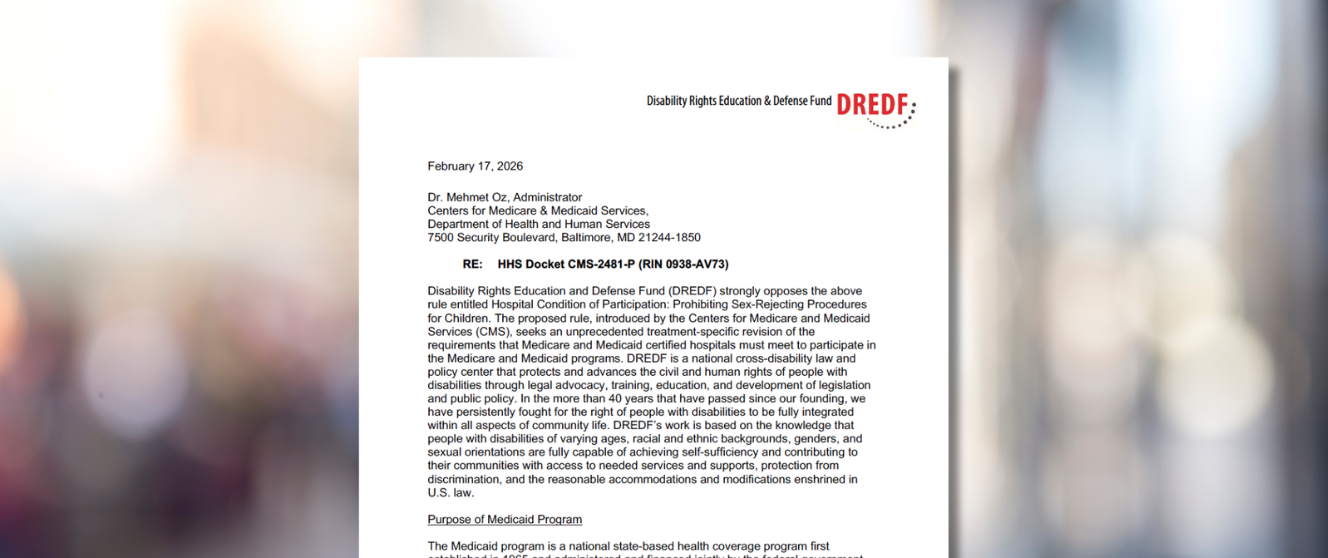
Seema Verma, Administrator
Centers for Medicare & Medicaid Services
7500 Security Blvd
Baltimore, MD 21244
Re: Request to Amend the MassHealth 1115 Demonstration and Related State Plan Amendments
Disability Rights Education and Defense Fund (DREDF) appreciates the opportunity to provide comment on Massachusetts’s proposed amendment to its MassHealth Section 1115 demonstration request. DREDF is a leading national law and policy center that works to advance the civil and human rights of people with disabilities through legal advocacy, training, education, and public policy and legislative development. We are committed to increasing accessible and equally effective healthcare for people with disabilities, and eliminating persistent health disparities that affect the length and quality of their lives.
It has been very difficult to obtain actual data to establish the numbers of people with disabilities among the Medicaid expansion population, given the dearth of both tracked disability-related questions and optional demographic information on disability in the streamlined enrollment application. Nonetheless, we submit that many working low-income people with disabilities, including individuals with multiple chronic conditions such as heart disease and diabetes who may not typical identify as a person with a disability, have enrolled in Medicaid through the expansion option. Consequently, we are deeply concerned by the proposal to eliminate the non-emergency medical transportation (NEMT) benefit for MassHealth CarePlus enrollees, otherwise known as the Medicaid expansion population, except for transportation for substance use disorder (SUD)-related services.
Section 1902 of the Social Security Act (“the Act”) authorizes Medicaid NEMT benefits, and federal rules require states to “ensure necessary transportation for beneficiaries to and from providers.” Section 1115 of the Act does allow states to waive certain federal requirements so long as the waiver continues to promote the objectives of the Medicaid program: to provide coverage and care to individuals who cannot afford the cost of medically necessary care. However, DREDF does not believe Massachusetts’ request to eliminate NEMT for CarePlus enrollees promotes the objectives of the Medicaid program, and we ask that this provision not be approved. Specifically, we believe denying NEMT to the majority of the Medicaid expansion population hinders the goal of providing medically necessary services to low-income populations,including people with disabilities, and therefore recommend the provision be rejected.
Low-income people with disabilities need non-emergency medical transportation for accessing necessary care and to remain in the community
Low-income consumers, such as MassHealth CarePlus enrollees, may not have access to reliable, affordable and physically accessible transportation, and therefore NEMT is a critical component to access health care services. A number of studies suggest that transportation barriers often lead to delayed or missed care for patients, and Medicaid enrollees are disproportionately impacted by transportation barriers. Estimates show that nearly 3.6 million people nationally miss or delay medical care each year because they lack available or affordable transportation. Additionally, a January 2016 report by the United States Government Accountability Office concluded that the NEMT benefit “can be an important safety net for enrollees as research has identified the lack of transportation as affecting Medicaid enrollees’ access to services.” People with disabilities have a thinner margin of health, and their capacity to maintain their health, jobs, family and other life responsibilities depends on getting timely access to needed care. The risk of institutionalization or hospitalization increases when individuals are not able to access medically necessary treatment, negatively impacting health outcomes and resulting in higher overall health care spending.
Providing NEMT only for substance use disorder-related services will lead to barriers to care and undermines the goal of providing integrated, coordinated care
While we appreciate that the MassHealth CarePlus program will continue to cover transportation for SUD services, it is challenging to see how carving out transportation for this one kind of service will actually improve the health of enrollees with substance use disorders. Many people who struggle with SUD have co-occurring mental health disorders and other physical health conditions. These enrollees require services for all of these conditions to move forward in their recovery. In fact, more than 1.2 million individuals nationwide who are eligible for Medicaid expansion are projected to have some form of mental illness, including over 550,000 who will have disorders that impair their everyday functioning. Mental health services are often distinct from SUD services, and therefore lack of transportation to these services will impose a barrier to recovery. Moreover, someone who has back injuries or otherwise has an ongoing need for covered physical therapy or acupuncture services, but who cannot get need transportation to those services, will not necessarily benefit from SUD services delivered in the midst of ongoing chronic pain. CMS actively promotes coordinated care as a means of providing better care at a lower cost; a policy that carves out transportation undermines this fundamental tenant of an effective Medicaid delivery system.
Furthermore, eliminating NEMT for all services other than SUD services will likely exacerbate the ability of individuals with chronic conditions to receive care. For example, Medicaid patients diagnosed with conditions like cancer, mental illness and end-stage renal disease account for more than half of Medicaid transportation utilization, and these patients already face the greatest transportation barriers to receiving healthcare. Without NEMT, Medicaid expansion enrollees with these conditions will be unable to access critical treatment, which may result in increased spending for more expensive services, such as emergency room visits, hospitalizations and/or institutionalizations.
Non-emergency medical transportation is cost-effective
Research has found that providing NEMT to the Medicaid population is cost-effective and results in a positive return for states. For example, one Florida study estimated that 1% of all medical transportation trips prevent a one-day hospital stay on average, resulting in a return on investment of 11:1. Another study found that NEMT benefits are cost-effective or cost-saving for 12 medical conditions including prenatal care, asthma, heart disease and diabetes. NEMT allows individuals to access and receive care before medical conditions worsen or go unmanaged and eventually lead to costly emergency care or hospitalizations that could have been prevented.
NEMT is a cost effective service that removes one of the most significant barriers to quality health care for low-income people, including many people with disabilities who do not require medical services during transportation. Any barrier that makes it more difficult for people with disabilities and chronic conditions to get ongoing medical care in a consistent and timely manner places those individuals at risk of diminished health, reduced functionality, and unwanted, very expensive eventual institutionalization. DREDF asks you to reject the transportation request in the Massachusetts waiver amendment for the sake of the health of people with disabilities, as well as the long-term fiscal sustainability of Medicaid, in the state.
Yours Truly,

Silvia Yee
Senior Staff Attorney

